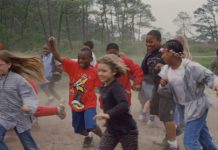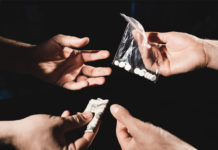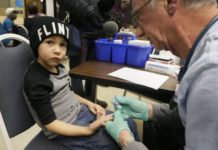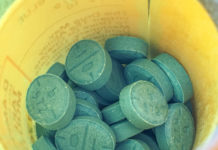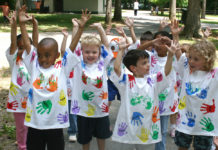Racism Linked to Poor Health Outcomes in Children
New study finds children who have been exposed to discrimination show higher likelihood of anxiety, depression, and ADHD.
43% Increase in ADHD Diagnoses among School-Aged Children in US
Citing a 43 percent jump since 2003, researchers estimate that 5.8 million school-aged children and teens in the US now have an ADHD diagnosis, a staggering 12 percent of this population. The new NIH-funded analysis also found that the percentage of girls diagnosed with ADHD was up 55% and that the percentage of Hispanic children diagnosed shot up 83% over the same timeframe.
Outdoor Education Tied to Psychological and Academic Benefits
How the satisfaction of basic psychological needs (BPN) in outdoor education environments can peak student interest and boost intrinsic motivation.
“Antipsychotic Use in Youth Without Psychosis: A Double-edged Sword”
This month’s issue of JAMA Psychiatry ran an editorial commenting on recent research revealing that the majority of youth prescribed antipsychotics have not been diagnosed with a mental disorder.
Experts Decry Dangerous Use of Antipsychotics in Children
In a featured article for Psychiatric Services, psychiatrists from Dartmouth raise the alarm on the increasing numbers of children prescribed dangerous antipsychotic drugs. Despite the fact that data on the safety of long-term use of these drugs in this vulnerable population “do not exist,” the rate of children and adolescents being prescribed antipsychotic drugs have continued to increase over the past fifteen years.
2 Reasons Why Time-Outs Do Not Work
The fundamental importance of connection to a child helps us to understand the use of "Time-Outs" which, used improperly, can be like pouring gas on a fire in a situation that is already not working; causing a distressed child to go further awry and potentially contributing to symptomatology that puts them at risk of being identified as ADHD, anxious, or bipolar.
The Presumption of Incompetence: Why Traditional ADHD Treatments Fail
The two most popular interventions for ADHD are drugs and stringent control. Those who believe in the traditional biological determinist view assert that others must provide the control that people diagnosed with ADHD lack. In this treatment protocol, diagnosed individuals are remanded into treatment that mimics institutional care (i.e., others control their access to resources and their behavior is restrained with drugs). While both of these impositions can yield some short-term benefits, they can also produce unwanted side effects much like what happens when there is incarceration
Researchers Argue that ‘ADHD’ Doesn’t Meet DSM Definition of a Disorder
New research questions whether the diagnosis of ADHD even meets the criteria for a disorder, as set out in the manuals used by the medical and psychiatric fields.
ADHD: Disempowerment By Diagnosis
Giving a diagnosis of ADHD can profoundly disempower students and lead to what psychologists call “learned helplessness.” Isn’t it time for those of us in education to reclaim our profession? Who are the teaching and learning experts? Doctors? Drug companies? We are! And if we don’t stand up—for our students—against disempowering diagnoses and harmful drugs, who will?
Humanistic Counseling Effective in Schools, Study Finds
Pilot study finds school-based humanistic counseling reduces emotional symptoms in students.
Drugging Toddlers for Inattention, Impulsivity, and Hyperactivity
On May 16, the New York Times ran an article titled Thousands of Toddlers Are Medicated for A.D.H.D., Report Finds, Raising Worries, by Alan Schwarz. Here is the opening sentence: "More than 10,000 American toddlers 2 or 3 years old are being medicated for attention deficit hyperactivity disorder outside established pediatric guidelines, according to data presented on Friday by an official at the Centers for Disease Control and Prevention."
More Children Receiving ‘Off-Label’ Antipsychotics for ‘ADHD’
Over the past twenty years, the number of prescriptions for atypical antipsychotics written to children and young adults between four and eighteen has increased...
Our Letter to Lancet Psychiatry
This is the cover letter that Mad in America Foundation sent to Niall Boyce, editor of Lancet Psychiatry, requesting that the journal retract Martine Hoogman's study of "subcortical brain volumes" in those diagnosed with ADHD.
Warning to Parents: Psychiatry is How Kids Get High and Die in the USA
Street drug dealers and stimulant-peddling doctors both get clients high and addicted for profit. So there is really no difference between what they do except that doctors are more ‘successful’ at it, since they enjoy many advantages over illicit dealers and can get away with doing it legally.
More Evidence for the Lasting Psychological Impact of Lead Exposure in Childhood
New research points to numerous harmful effects of high-level lead exposure in childhood on adult mental health and personality characteristics.
ADHD in France and America
We now have 40 plus years of diagnosing and medicating children for ADHD in the US, and at a population level there’s no evidence that US kids are mentally or cognitively ‘healthier’ than kids in other societies.
Better Sleep Helps With ADHD; Medications Worsen Sleep
"Sleep-focused treatment improves mood and quality of life in children with attention-deficit/hyperactivity disorder," reports Psychiatric News, covering a presention by Dalhousie University researcher Penny...
Stimulant Medication Use Linked to Sharp Increase in BMI by Eighth Grade
New evidence suggests that children on ADHD medication may have stunted growth initially but more rapid increases in body mass over time.
Transition into Poverty May Worsen Child and Maternal Mental Health
Transitioning into poverty linked to behavioral issues in children, but may be mitigated by mother’s mental health.
Only One-quarter of US Children Taking ADHD Stimulants Get Any Psychotherapy
Most US children and youth diagnosed with ADHD are taking stimulant medications, but less than one-quarter are receiving any amount of concurrent psychotherapy of...
Researchers Reveal Misconceptions About ADHD
A new article explains common misconceptions about ADHD that are held by teachers and mental health professionals and may lead to overdiagnosis and overmedication in schools.
Problem Behaviors are Medicalized in White Children and Criminalized in Black Children
Race often determines whether school punishment or therapy and drugs will be used to address children’s problem behaviors.
3 Facts All Parents Should Know About ADHD Stimulant Drugs
Medicating children for a host of mental disorders has become very popular in some parts of the USA. More than 8 million kids from 6 months to 17 years of age are on pharmaceutical drugs in this wonderful country. We lead the world in drugging youth for behavioral, cognitive and attention issues. We are once again #1. But I would like to share with parents as well as adults working with children a few not so readily available facts related to medicating kids for behavior issues.
Study Finds Music Therapy May Be Effective in Clinical Practice
In a new study published in The Journal of Child Psychology and Psychiatry, Professor Sam Porter and co-authors, present the results of a music...
Are We Discovering More ADHD?
This is an important issue. According to Centers for Disease Control and Prevention (CDC), the percentage of children with an ADHD diagnosis continues to increase, from 7.8% in 2003 to 9.5% in 2007 and to 11.0% in 2011. The CDC also notes that the base rates for ADHD varies substantially by state ranging from a low of 4.2% in Nevada to a high of 14.8% in Kentucky.




